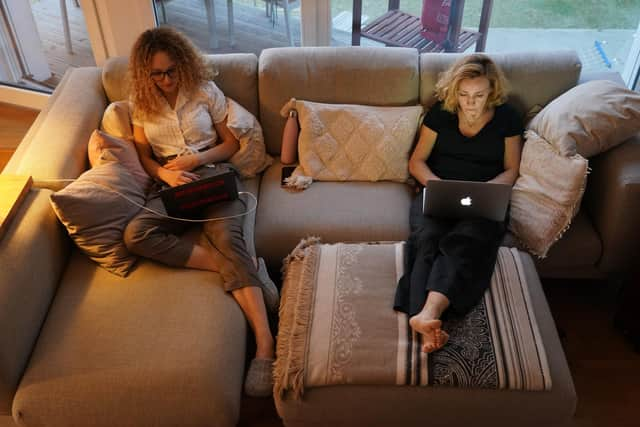UK adults spent more time online a day in 2020 than European peers, Ofcom reveals
The regulator’s Online Nation 2021 report has looked at the country’s digital habits, and “delivers a snapshot of an unprecedented year, when communication, entertainment, culture, retail, work and education moved more online”.
It also highlighted the darker side of online life such as an increase in scams, and the negative impacts reported by young people.
Advertisement
Hide AdAdvertisement
Hide AdUK adults spent an average of 217 minutes on desktop, smartphones or tablets each day last year – more than an hour longer than in Germany and France, and 30 minutes more than Spain.


Brits also spent nearly £2.45 billion on, and in, mobile apps last year, with Tinder, Disney+, YouTube and Netflix topping the list.
With high-street shops forced to close, UK online shopping sales rose by half to nearly £113bn.
The online stores of food and drinks retailers saw the biggest increase in sales – up 82 per cent on 2019 levels – while household goods also surged, due to heightened interest in home improvements (up by three quarters).
Ofcom added that children’s online purchasing power is also growing. Since the spring 2020 lockdown, teenagers have been spending more money online than offline, and this trend has continued into 2021 (68 per cent online compared to 32 per cent offline in March 2021).
Around one in eight online adult Brits and more than one in five of those aged 15-34 said they used an online dating service before the spring lockdown in 2020 – but the imposition of such restrictions saw an increase in romance scams, with money lost to fraudsters increasing by 12 per cent to £18.5 million.
Social video sites and apps were found to be used by 97 per cent of UK adult internet users, with those aged 18 to 24 spending an average of an hour and 16 minutes per day on YouTube in September 2020 –up 11 minutes since 2019, and TikTok growing from three million UK adult visitors in September 2019 to 14 million by March 2021.
Furthermore, despite most platforms setting their minimum user age at 13, about six in ten UK children were found to use social media by the time they are 11.
Pressure
Advertisement
Hide AdAdvertisement
Hide AdAbout nine in ten of those aged eight to 15 said social media helped them feel closer to friends during the pandemic – but a similar proportion of teenagers cited it prompting popularity pressures.
Two thirds of boys and three quarters of girls aged seven to 16 also agree that social media can cause worries about body image.
More than half of 12-15year-olds reported having a negative experience online last year.
The most common experience, cited by 30 per cent, was someone they didn’t know attempting to befriend them online.
Just under a fifth had seen something scary or troubling, while about the same proportion reported seeing content of a sexual nature that made them uncomfortable.
Yih-Choung Teh, Ofcom’s group director of strategy and research, said: “This research is critical to keep pace with these changes in technology, economics and behaviour, as we prepare to take on new responsibilities for regulating online safety.”
A message from the Editor:
Thank you for reading this article. We're more reliant on your support than ever as the shift in consumer habits brought about by coronavirus impacts our advertisers.
If you haven't already, please consider supporting our trusted, fact-checked journalism by taking out a digital subscription.
Comments
Want to join the conversation? Please or to comment on this article.
